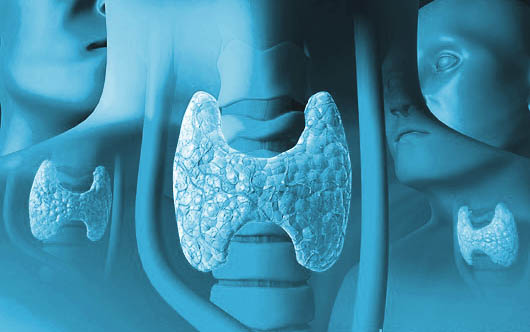
Reflexology is a gentle, complementary and alternative medical (CAM) therapy in which pressure is placed along reflex points on the feet, lower leg, hands, face, or...
 If you haven't been following my latest series, I've been discussing the thyroid gland. This seemingly insignificant organ produces hormones that can affect the metabolic rate of every cell in your body. If the thyroid is not functioning properly, your body will begin to feel the negative results of this malfunction.
If you haven't been following my latest series, I've been discussing the thyroid gland. This seemingly insignificant organ produces hormones that can affect the metabolic rate of every cell in your body. If the thyroid is not functioning properly, your body will begin to feel the negative results of this malfunction.Last week in Part 3 (Read Part 1, Part 2) I explained the effects of a slow thyroid gland that is not producing enough hormone. This condition is called hypothyroidism.
When the thyroid gland produces too much hormone, this we know as hyperthyroidism. Hyperthyroidism is not as common as hypothyroidism. However, it is still one of the most common thyroid gland dysfunctions affecting almost three hundred thousand people in the United States.
Like hypothyroidism, because of the autoimmune element of hyperthyroidism, it is often undiagnosed until the thyroid gland has been significantly damaged. There is no known cure for autoimmune conditions. Identifying and addressing disorders of the thyroid early is crucial to managing this condition. Nutrition and lifestyle choices can improve quality of life for those suffering from this condition considerably.
In my next post I will explain autoimmune thyroid, its possible causes and complications. And we will also learn what can be done to regulate the immune system so as to slow down the progression of these and other autoimmune diseases.
Stay tuned for Part 5 of Healthy Thyroid Function.
Do you suspect you have thyroid health issues but your doctor tells you your thyroid is fine? A FUNCTIONAL THYROID CHECK is a thorough examination of your thyroid and all its related hormones. Click the button below to sign up for a FREE 15 Minute Thyroid Consultation!

Reflexology is a gentle, complementary and alternative medical (CAM) therapy in which pressure is placed along reflex points on the feet, lower leg, hands, face, or...
